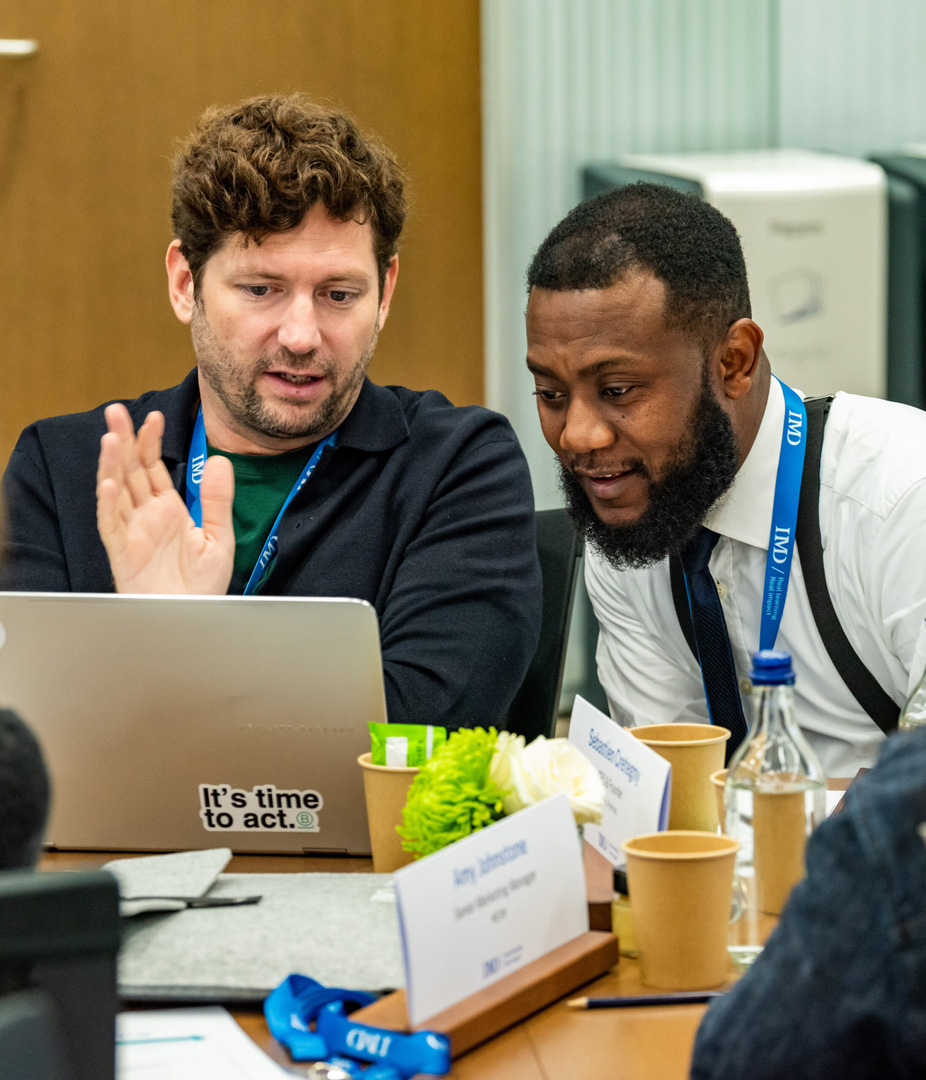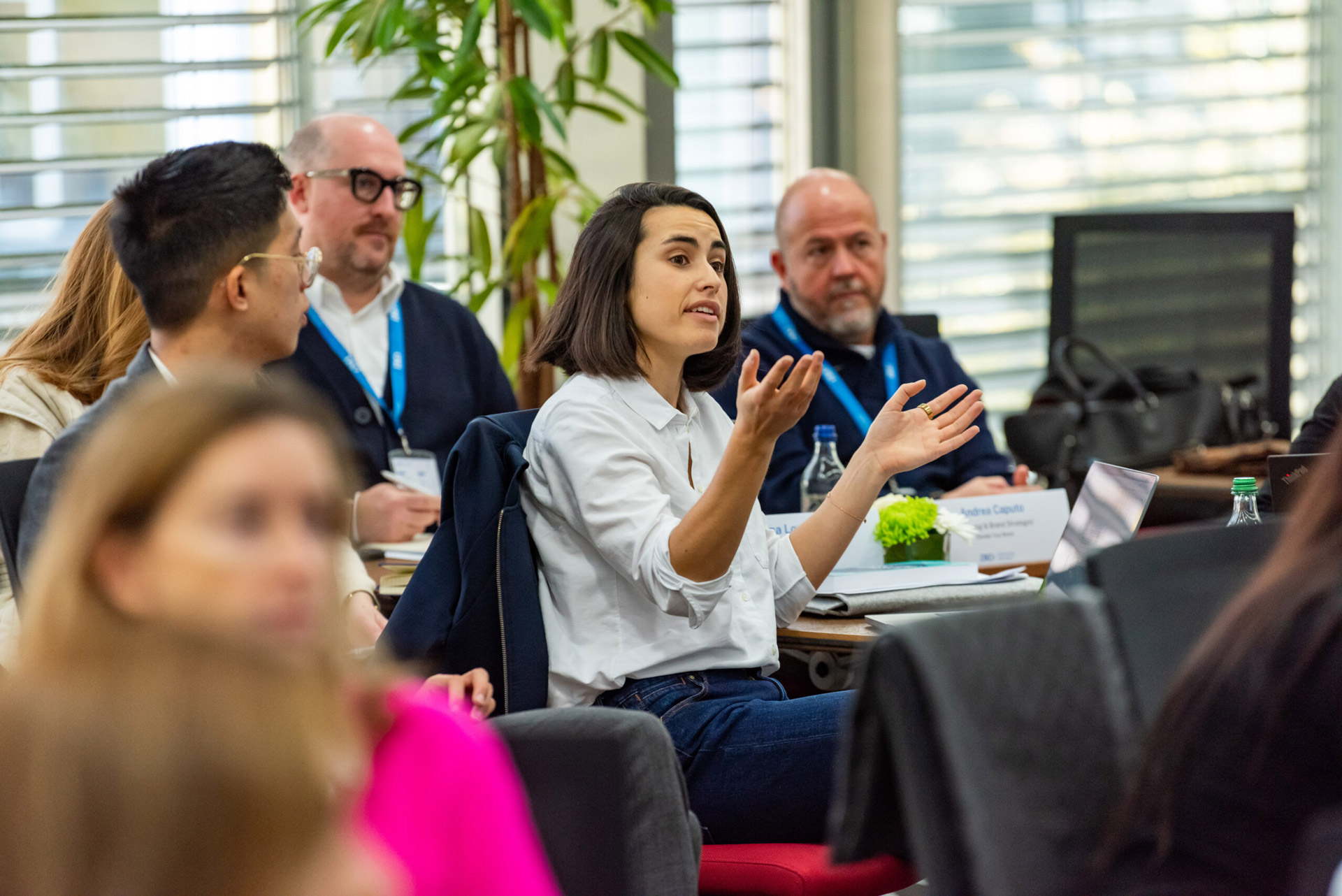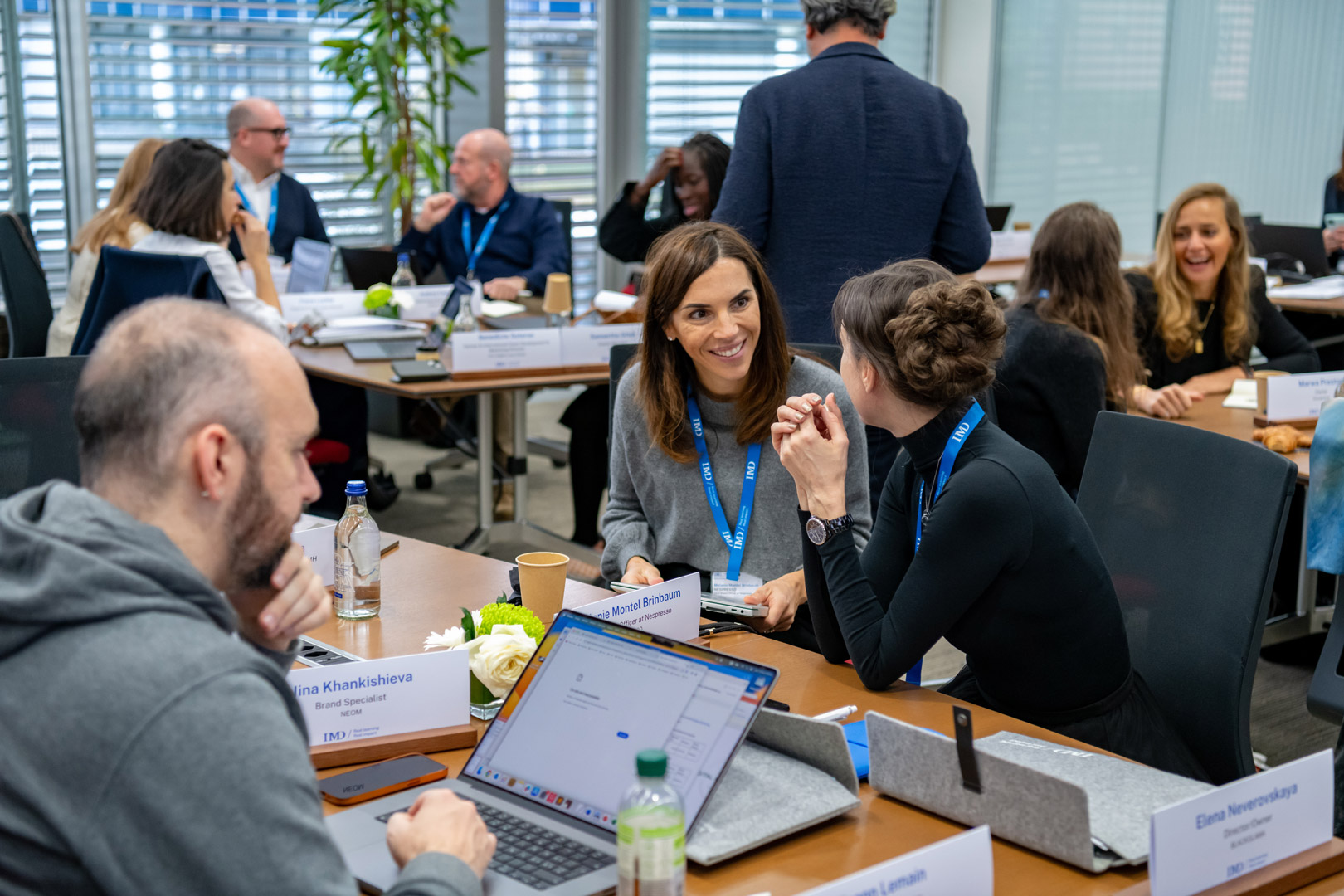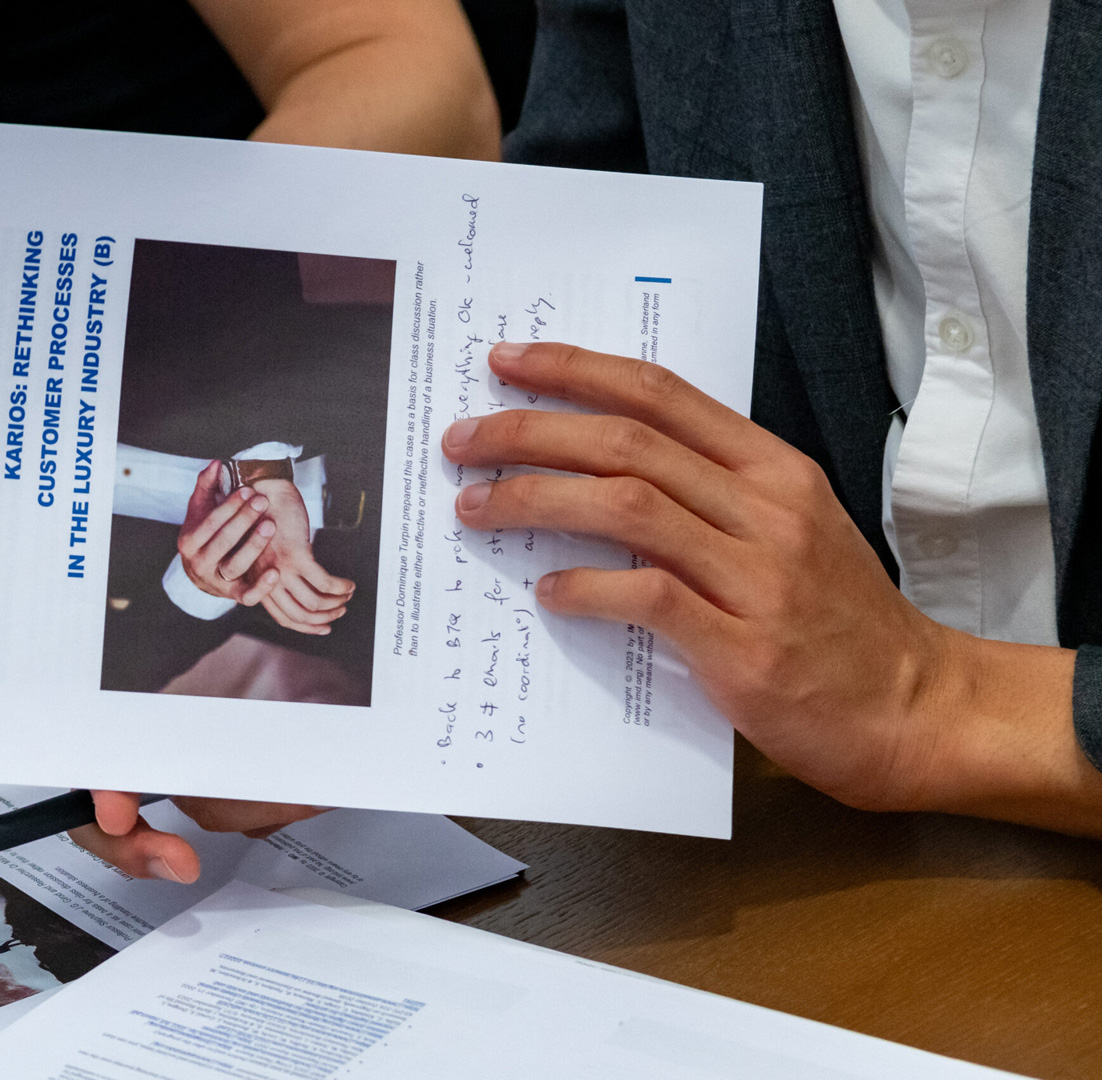IMD business school for management and leadership courses



Custom programs
IMD’s custom Executive Education programs are designed in collaboration with organizations to address their unique challenges and objectives. We design learning journeys on sustainability with our corporate clients, meeting the learning objectives in their sustainable business transformations.
In 2023, IMD worked with companies across a wide range of industries, including energy, technology, and luxury goods.

Leading in sustainability
Siemens, a leading global technology company focused on industry, infrastructure, mobility, and healthcare, actively pursues sustainability through its comprehensive DEGREE strategic framework, which aligns with its ambitious commitment to becoming the global leader in sustainable technologies.
The DEGREE framework meticulously outlines Siemens’ commitment to six fields of action: decarbonization, ethics, governance, resource efficiency, equity, and employability, each backed by stringent and measurable metrics.
In 2023, in collaboration with IMD, Siemens embarked on a transformative journey through the development of its ‘Leading in Sustainability’ program, which was tailor-made for its most senior leaders. The initiative is a testament to Siemens’ resolute commitment to accelerate sustainable practices, not only within its operations but also by enabling its partners across a broad spectrum of industries to be more sustainable.
Two hundred leaders from across seven cohorts attended the two-day program either at IMD’s campus in Lausanne or at the specialized learning campus in Munich. The program’s content, curated by IMD faculty Julia Binder, Knut Haanaes, and Frédéric Dalsace, covered pivotal topics such as future-back thinking, sustainability strategy integration, circular business models, and organizational readiness. It aimed to not only impart knowledge on these key topics but also to foster a shared language and a collective ambition among Siemens’ leaders.

“Sustainable transformation requires leadership and organization to address paradigm shifts. With our Top Management Leadership Program, “Leading in Sustainability,” which we co-created with IMD, we connected and enabled our global top 200 leaders and selected talents to successfully shape this critical leadership journey.”
“Most relevant topics were discussed in highly interactive sessions. Key leadership themes included how to use organizational levers to accelerate sustainability transformation and how to deal with dilemmas, own leadership behaviors, and dimensions of organizational readiness,” said Matthias Reuter, Global Head of Siemens Leadership Excellence.
Siemens leaders left the program equipped with a newfound perspective on sustainability and the ability to act as sustainable change agents within the company. The success of the Leading in Sustainability program is underscored by Siemens’ strategic decision to extend its reach digitally and to engage an additional 20,000 leaders around this important topic.
The digital rollout also signifies a commitment beyond a singular program, evolving into a company-wide learning initiative. Siemens envisions the extended program as a cornerstone for the business, empowering leaders with the tools and skills required to embed sustainability into their daily business practices.
“Technology drives sustainability. At Siemens, more than 90% of our portfolio may enable our customers to have a positive impact on sustainability. Understanding our impact, connecting it to the megatrends that change our world, and developing it as a strategic business opportunity is at the core of this training we co-developed with IMD.”
“The professors at IMD artfully connected the planetary sustainability challenge with strategic frameworks, circularity, and principles of organizational readiness. The professional delivery and continuous activation of all participants have resulted in an acceleration of sustainability at Siemens. Thank you so much,” said Eva Riesenhuber, Siemens Global Head of Sustainability.
Siemens’ collaboration with IMD is more than a conventional learning experience; it serves as a catalyst for a cultural shift within the organization, shaping leaders who are not only well-versed in sustainability principles but are also actively driving Siemens’ future on a global scale.
Redefining Richemont’s sustainability strategy framework
Doing business responsibly is at the core of Richemont’s values. Richemont is the world’s third-largest luxury group, which owns 27 prestigious brands across watches, jewelry, fashion, and accessories. Recognized for its brands, including Cartier, Van Cleef and Arpels, Jaeger Le Coultre, and Chloé, Richemont believes in adding value to society beyond the scope of its business.
Richemont is on a journey of continuous improvement as it looks to safeguard the planet while crafting a more sustainable, responsible future. In line with this commitment, Richemont engaged IMD to design and deliver a CEO Sustainability Forum for key C-suite executives.
The CEO Sustainability Forum was attended by 70 executives from across the Richemont Group, including luxury brand Maisons, the Group Management Committee, regional presidents, and functional heads.

IMD professors Knut Haanaes, Julia Binder, and program director Stéphane JG Girod delivered a number of strategic sessions, enabling executives to reflect on and define the way forward for sustainability in line with the work that Richemont’s newly appointed Chief Sustainability Officer, Bérangère Ruchat, and her team had been doing.
The journey aimed to help Richemont executives understand why sustainability matters to the company’s future. They learned about formulating, executing, and leading a sustainability strategy and potential future business model opportunities. Additional sessions with sustainability experts from the luxury industries and other key sectors were held.
The forum concluded with the co-creation of commitments and priorities to support Richemont’s sustainability strategy framework, which Girod presented to the board’s Governance & Sustainability Committee.
Enhancing sustainability in the luxury sector
Cartier, the Richemont-owned iconic luxury brand for jewelry and timepieces, is recognized for advancing sustainability initiatives.
In 2022, Cartier and Kering co-founded The Watch & Jewellery Initiative 2030, a global initiative that seeks to unite all members of the Watch and Jewelry industry in a commitment to three ambitious and common objectives, namely building climate resilience,
preserving resources, and fostering inclusiveness.
In 2023, Cartier’s industrial manufacturing entity, Cartier Industrie, approached The Enterprise for Society Center (E4S) to design and deliver a customized learning and development journey for its entire management team.
E4S is a partnership between three institutes of academic excellence: the Institute for Management Development (IMD), the University of Lausanne through its Faculty of Business and Economics (UNIL-HEC), and the École polytechnique fédérale de Lausanne (EPFL).
The sustainability-focused program, attended by almost 120 managers, was held over two and a half days at IMD’s campus in Lausanne. It included a number of sessions with expert faculty from across IMD, EPFL, and UNIL-HEC, as well as guest speakers from within the industry and other key sectors.

The program provided Cartier Industrie’s executive team with the opportunity to refine and structure their sustainability strategy at Horizon 2030 and align it further with Cartier’s overall sustainability priorities.
The program was also transformational for many participants, who not only gained a deeper understanding of the sector’s sustainability challenges and opportunities but were also equipped with the tools and frameworks for advancing Cartier’s sustainability agenda.
A key focus area was co-creating concrete initiatives in the supply chain and operations to deliver the refined strategy for 2030. Finally, participants gained a common language to enhance collaboration amongst key stakeholders. Across four cohorts, the program generated an average 83% net promoter score.

“We were very impressed with IMD and E4S’s ability to put together a comprehensive and compelling sustainability training program tailor-made to Cartier Industrie’s needs. The training met our expectations and achieved our three objectives: instruct, inspire, and drive change.”